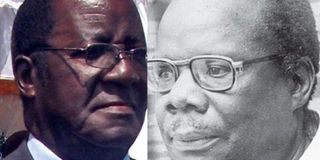1980 elections should not have been held, says former EC boss

Vincent Ssekono(L) and Paul Muwanga. File photos
What you need to know:
Uphill task. When one talks about the sham December 10, 1980 general election, Vincent Ssekono is the most prominent name mentioned. Some even mistakenly refer to him as the former chairman of the electoral commission that organised the scandalous elections. In Witness this week, he reveals to Faustin Mugabe the pits and falls encountered during the exercise.
I was appointed the secretary to the Electoral Commission by [President Godfrey] Binaisa through the head of the Public Service, a one Gowa. Gowa recommended me to Binaisa.
Immediately after my appointment in March, I was sent to Nairobi, Kenya for a short course in election management. While there, I saw two bye-elections, which were a crucial experience in handling elections. But when I returned in June, 1980, Binaisa had been deposed [in May] by the Military Council chaired by Paulo Muwanga, [president Milton] Obote’s confidant.
Running behind time, I worked tirelessly to have the elections held in December 1980 as scheduled. This was the first general election in the post Idi Amin era; 18 years since the last elections were conducted in 1962. So upon my appointment, I became the nucleus of what was to be the first Electoral Commission in Uganda. The 1962 elections were organised by a special committee appointed by Governor Fredrick Crowford and headed by Ronald C Peagram, a British who had been with the Public Service in Colonial Uganda. UPC unfairly won DP and Milton Obote became the prime minister of Uganda.
The 1980 elections should not have been held. I don’t think the country was ready. You see, in 1980, Uganda had not had elections for 18 years. We were supposed to have elections after five years from 1962, then in 1971, which did not happen because of political problems.
When Amin came to power in 1971, you could not talk about elections. When he was removed in 1979, we had three governments but still did not have elections. I think the leaders should have done like [President] Museveni did in 1986. The President asked for four years to prepare the country for elections.
Pressure from electorate
I could understand the pressure from the population demanding elections there and then. But the country was poorly prepared for the exercise in terms of civic educations, finance, infrastructure and technical competencies. The electoral law we used in 1980, the colonial Act [of 1957], was no longer appropriate in the circumstances at the time.
Whereas Uganda had an estimated population of 12,636,179, only about 100,000 were registered as voters in an exercise that ran from October 6 to October 23, 1980. [The Electoral Commission today spends about six months preparing the voters’ registers].
Under such circumstances, the elections were not free and fair.
First of all, the appointment of the Commission was lopsided. The Commissioners were biased towards UPC. Almost all of them were UPC members, apart from one or two. An election is a process. It includes registration, demarcation, nomination, polling, counting of votes and announcement. So these commissioners helped UPC rig at every level. Every activity was rigged.
Appointing UPC members as commissioners was rigging. UPC was a party that was going to participate in the elections and appointing party members as commissioners was definitely rigging for the party.
I could not do anything about the rigging. What could the secretary of the Commission do? They were the bosses. I was only a civil servant with no power to do anything.
If the elections had been free and fair, in my opinion, DP would have won. But the electoral process was interrupted. For instance, Muwanga hijacked the Electoral Commission’s powers. As the vote-counting was going on, he announced that nobody should communicate the results after counting the votes apart from he himself. Whoever broke that law would pay a fine of Shs500,000 (more than Shs50m today) or serve a five-year sentence or both.”
Ssekono flees to exile
When Muwanaga issued the infamous proclamation that only he would announce the election results, Ssekono says he knew he was the target. “After elections, I stayed in Uganda for three days, before I found a safe passage to Britain where I stayed until the UPC regime had collapsed,” he says. When he returned, President Museveni, a UPM Presidential candidate in the 1980 elections, was the President after a five-year war.
Ssekono was among the under secretaries President Museveni appointed in the earliest days of his government. Later, Ssekono served in many capacities, including permanent secretary in different ministries. Today, he is a retired civil servant.




